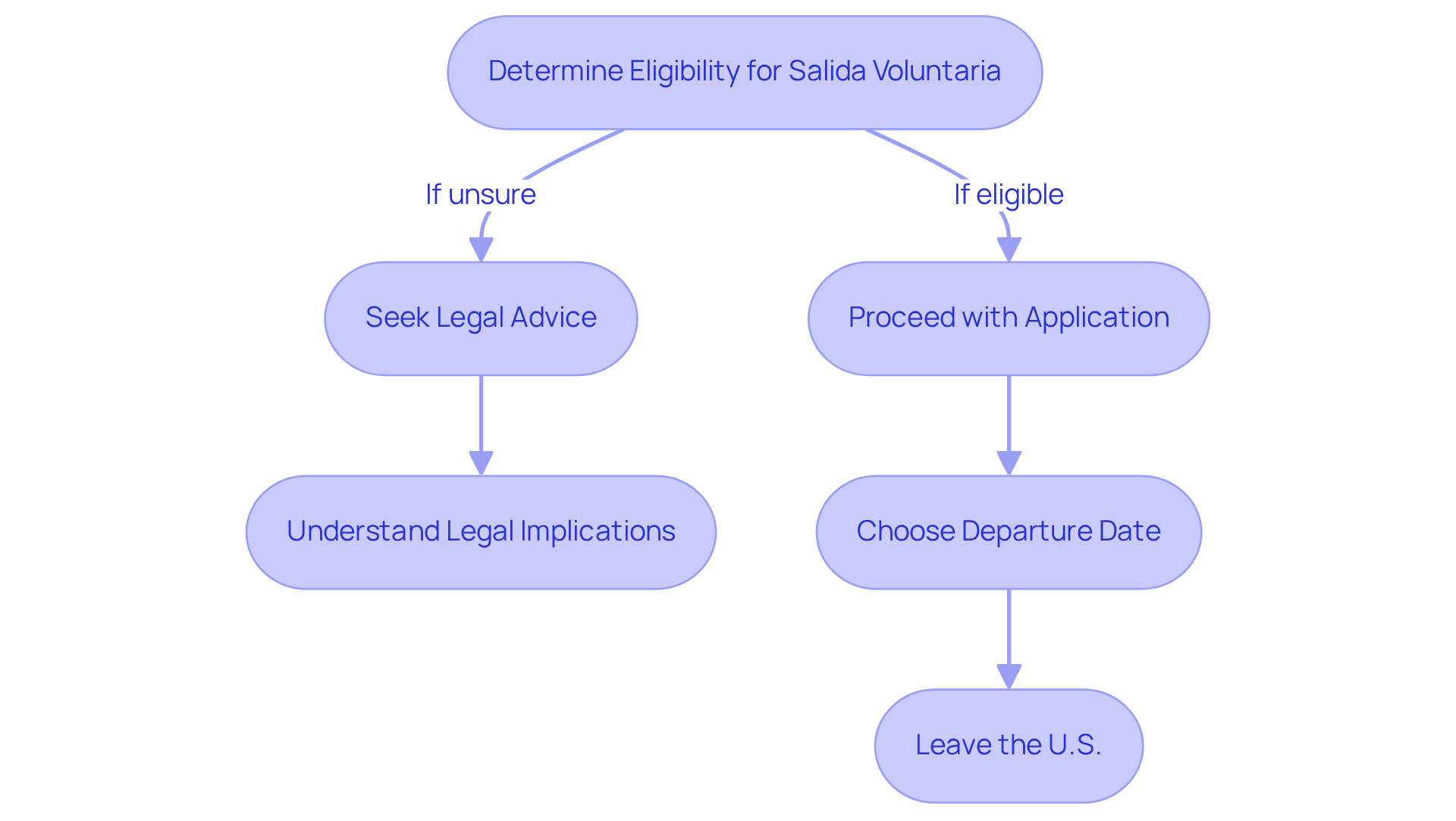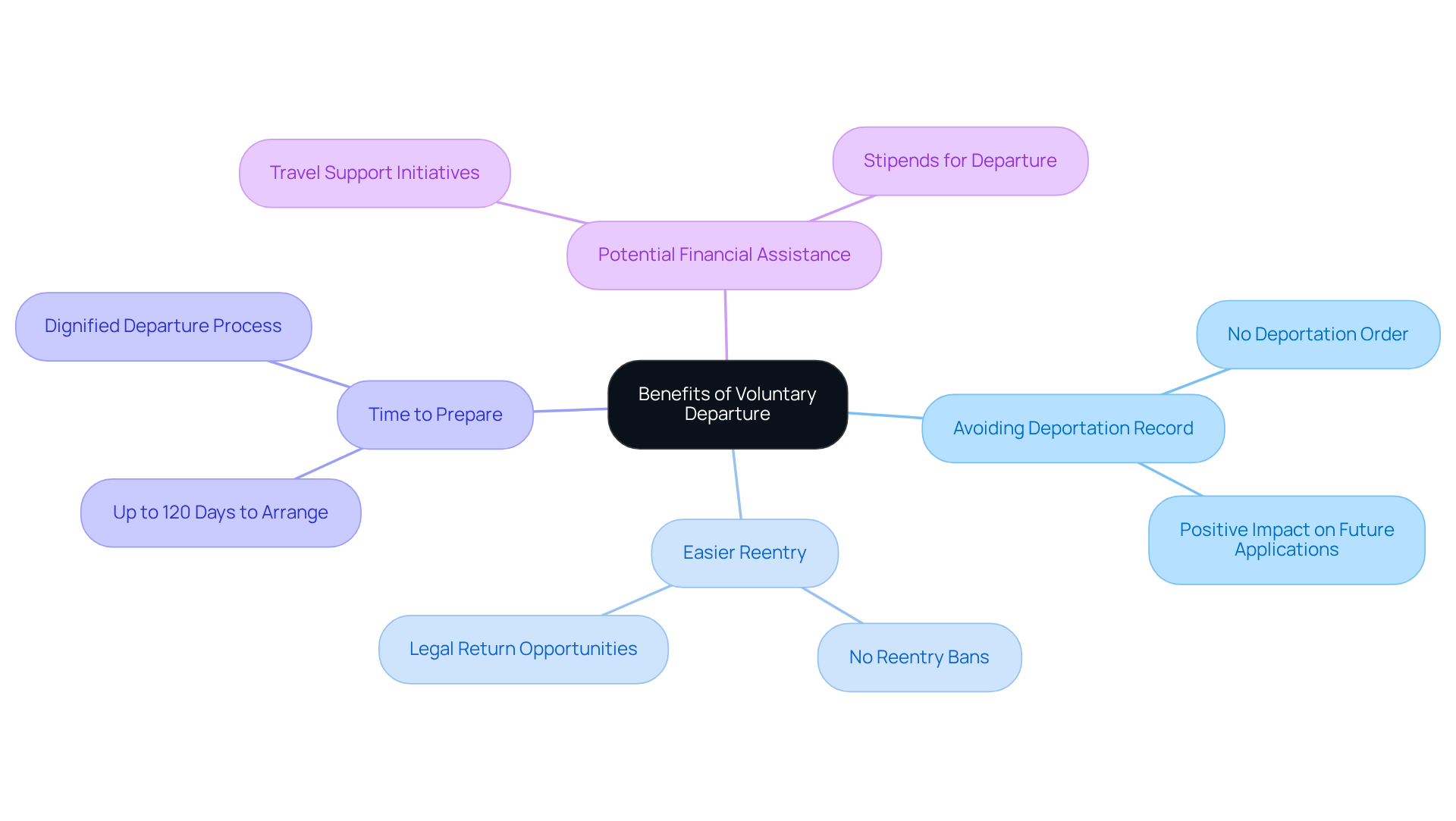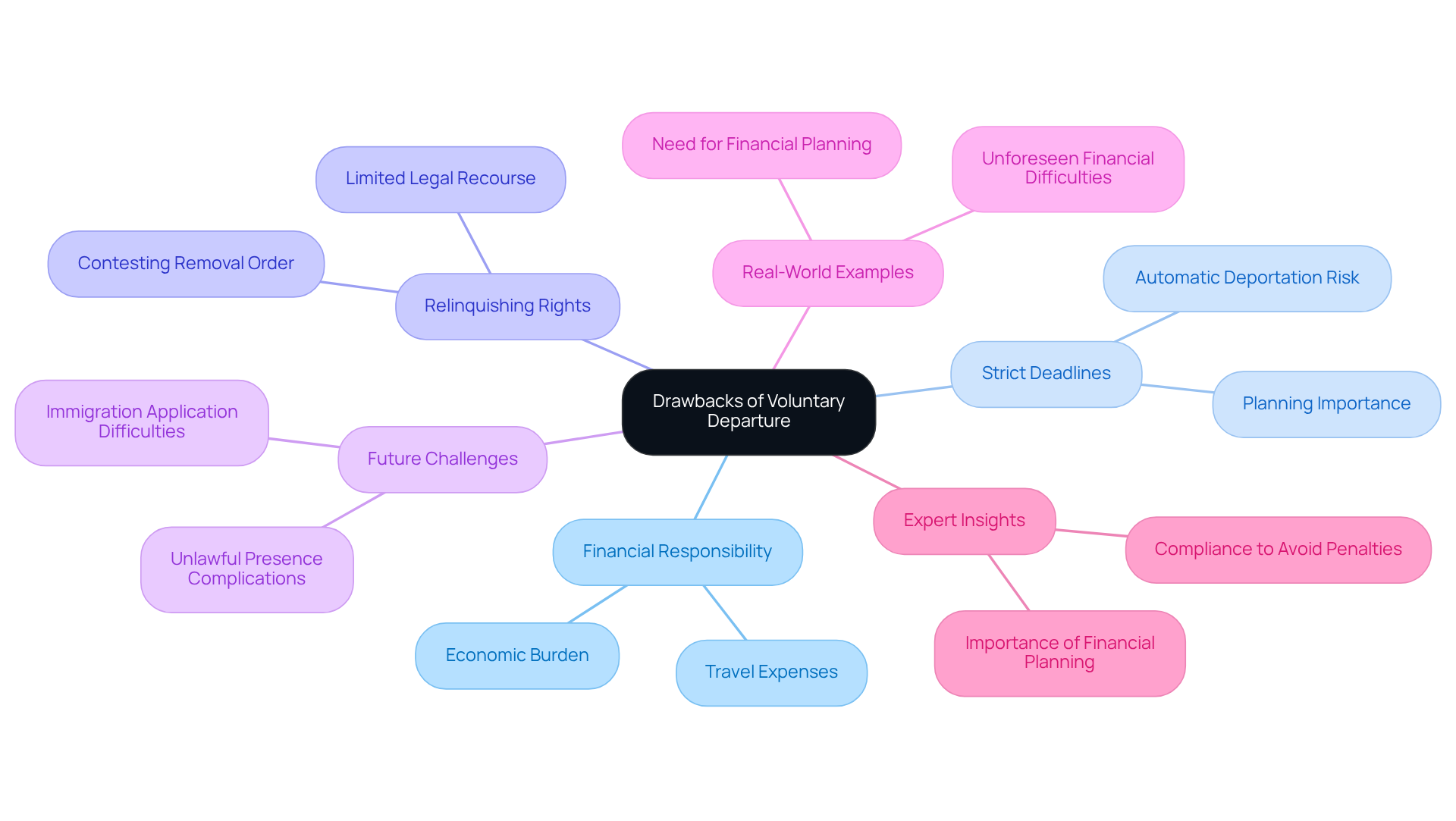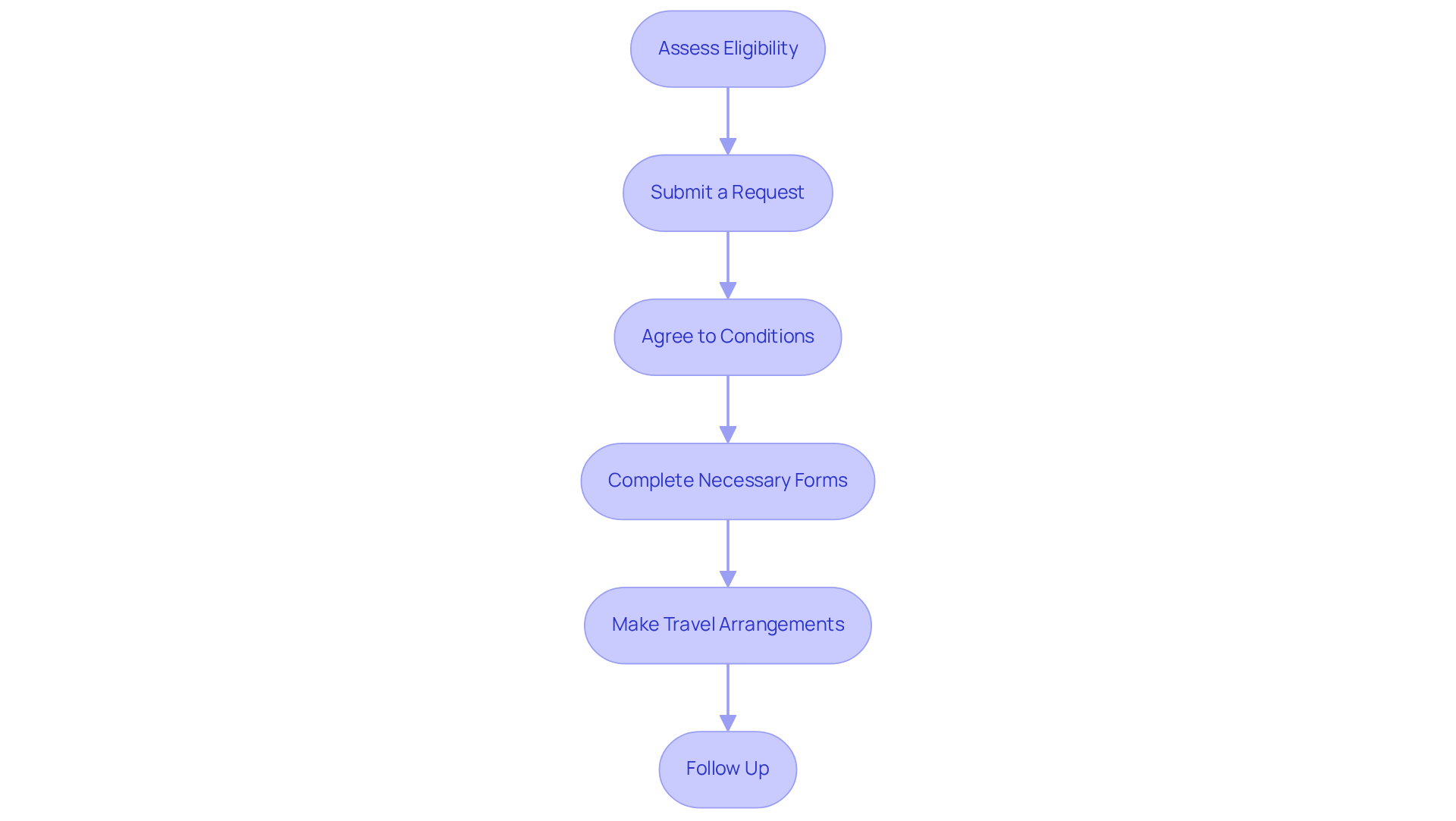Overview
This article highlights the compassionate option of "salida voluntaria de Estados Unidos," or voluntary departure from the U.S. This process allows non-citizens to leave the country on their own terms, providing a sense of control rather than facing the distress of deportation. It's important to remember that choosing voluntary departure can help individuals avoid the long-term consequences of a deportation record, offering a structured and supportive pathway for those facing removal proceedings.
Many individuals may feel overwhelmed by the complexities of immigration laws and the fear of deportation. This option not only alleviates some of that anxiety but also presents a preferable choice for many. By taking this step, individuals can secure their future with dignity, knowing they made a conscious decision to leave rather than being forcibly removed.
If you or someone you know is grappling with the possibility of deportation, consider the benefits of voluntary departure. This choice can provide a smoother transition and a chance to leave the U.S. on a more positive note. Seeking legal assistance can further empower you, ensuring that you navigate this process effectively and with understanding.
In moments like these, it’s vital to recognize the importance of support and guidance. You are not alone in this journey; there are resources available to help you make informed decisions. Remember, taking control of your situation can lead to a more hopeful future.
Introduction
Navigating the complexities of immigration can feel overwhelming, particularly for non-citizens facing removal proceedings.
Salida voluntaria de Estados Unidos, or voluntary departure, presents a compassionate alternative to formal deportation. This option allows individuals to leave the U.S. on their own terms, all while preserving future immigration opportunities.
Yet, the decision to pursue this path brings forth important questions:
- What are the genuine benefits of choosing voluntary departure?
- What are the potential drawbacks of choosing voluntary departure?
It's essential to understand these factors, as they can significantly influence your immigration journey and future prospects. You may be feeling uncertain, but know that exploring this option with care can lead to a more hopeful outcome.
Define Salida Voluntaria: Understanding Voluntary Departure from the U.S.
Salida voluntaria de Estados Unidos, or optional exit, is a compassionate legal mechanism that allows non-citizens to leave the United States willingly, helping them avoid the often daunting experience of formal deportation. If you find yourself in removal proceedings, the option of salida voluntaria de estados unidos provides a chance to leave the U.S. on your own terms rather than facing a deportation order. By choosing this path, you can arrange a salida voluntaria de Estados Unidos within a specified timeframe, which may help you evade the harsh consequences tied to an official removal order.
This process can be particularly beneficial for those who wish to keep the door open for a salida voluntaria de estados unidos for future returns. Unlike a deportation order, which carries long-term repercussions, opting for the salida voluntaria de estados unidos allows for a more hopeful outlook. In 2025, this route has become increasingly significant, with many individuals selecting it as a preferable alternative to the salida voluntaria de estados unidos. Immigration attorneys note that choosing the salida voluntaria de estados unidos can enhance your future immigration possibilities, allowing you to leave without the burden of a deportation record.
Statistics show a rising trend of individuals opting for salida voluntaria de estados unidos, reflecting a shift in how non-citizens navigate their legal challenges. It's important to remember that understanding the legal implications of your choice is essential. Seeking guidance from legal experts can ensure you meet the necessary qualifications and avoid potential pitfalls, such as abandoning pending asylum applications.
The optional exit procedure, referred to as 'salida voluntaria de estados unidos,' not only provides a pathway for legal departure but also empowers individuals to take proactive steps regarding their residency status. You may be feeling overwhelmed by the , but remember, you are not alone. Reach out to a legal professional who can support you through this process and help you find the best solution for your situation.

Explore Benefits of Voluntary Departure: Pros for Immigrants
The benefits of salida voluntaria de estados unidos are significant and can truly make a difference in your journey.
- Avoiding Deportation Record: By choosing salida voluntaria de estados unidos, you can steer clear of a deportation order on your immigration record. This choice can help you avoid long-lasting negative effects on future immigration applications, allowing for a salida voluntaria de Estados Unidos and enabling you to move forward with hope.
- Easier Reentry: If you decide on the salida voluntaria de estados unidos, you may find it easier to return to the U.S. legally in the future. Unlike those who are formally deported, opting for salida voluntaria de estados unidos means you won't be subject to the same reentry bans, which can provide a sense of relief.
- Time to Prepare: The salida voluntaria de estados unidos typically grants you a set period—often up to 120 days—to make necessary arrangements before leaving the country. This allows for a more dignified salida voluntaria de estados unidos, providing you with the time you need to prepare.
- Potential Financial Assistance: Recent initiatives, like the CBP Home Mobile App, offer financial incentives for those considering the salida voluntaria de estados unidos. This includes travel support and stipends, making the salida voluntaria de estados unidos process a little easier.
At Vasquez Law Firm, we truly understand the challenges faced by immigrant families. We are here to provide accessible legal representation, ensuring that financial constraints do not hinder your ability to seek justice. With no upfront costs and flexible payment plans, we strive to make the process as supportive as possible. You deserve to with confidence and care.

Examine Drawbacks of Voluntary Departure: Cons to Consider
While voluntary departure offers certain benefits, it also presents significant challenges that you must carefully consider:
- Financial Responsibility: If you choose voluntary departure, you'll be responsible for your own travel expenses, which can vary widely—often ranging from hundreds to thousands of dollars. This financial burden can be a crucial element in your decision-making process, especially if you're already facing economic difficulties.
- Strict Deadlines: It's important to remember that adhering to the specified leave date is crucial. Failing to leave on time can trigger an automatic deportation order, leading to severe consequences, including a potential 10-year ban on reentry into the United States. Statistics indicate that many people struggle to meet these deadlines, underscoring the importance of careful planning.
- Relinquishing Rights: Opting for a salida voluntaria de estados unidos may require you to relinquish your right to contest your removal order. This decision regarding the salida voluntaria de estados unidos can significantly limit your options for legal recourse, making it essential to weigh the potential long-term implications.
- Future Challenges: Future immigration challenges may arise even if you opt for the salida voluntaria de estados unidos, as this choice helps you avoid a formal deportation record but does not eliminate difficulties in future immigration applications. Financial obligations related to this option can complicate your reentry plans, particularly if you have accumulated unlawful presence.
- Real-World Examples: Many individuals have shared their experiences of encountering unforeseen financial difficulties while preparing for a chosen exit. These stories highlight the need for thorough financial planning and consultation with legal experts to navigate the complexities involved.
- Expert Insights: Immigration specialists emphasize that understanding the financial effects of voluntary exit is essential. As one expert noted, "Voluntary exit offers a less severe alternative to deportation, but it requires careful financial planning and compliance to avoid severe penalties." This perspective reinforces the importance of informed decision-making in the context of immigration processes.

Guide to Applying for Voluntary Departure: Step-by-Step Process
Applying for voluntary departure can feel overwhelming, but understanding the essential steps can help ease your journey:
- Assess Eligibility: It's important to confirm that you meet the eligibility requirements for optional exit. Typically, this means being physically present in the U.S. for at least one year and having no , which may involve a salida voluntaria de Estados Unidos. Take a moment to reflect on your situation—knowing your eligibility can provide clarity.
- Submit a Request: During your court hearing regarding residency, kindly ask the judge for a self-initiated exit. Be prepared to express your reasons for seeking this option, as the judge will take your unique circumstances into account. Remember, your voice matters in this process.
- Agree to Conditions: If your request is granted, you will need to agree to the salida voluntaria de estados unidos by a specified date and waive your right to appeal the removal order. This is a significant step, so it’s crucial to understand what it entails.
- Complete Necessary Forms: Fill out the required forms, including Form I-210, Notice of Action—Voluntary Departure, and submit them to the appropriate authorities. Taking this step can feel daunting, but it’s a vital part of formalizing your request.
- Make Travel Arrangements: Once your approved exit is confirmed, promptly organize your travel plans to ensure you comply with the designated leaving timeframe. Planning ahead can alleviate some stress as you prepare for this transition.
- Follow Up: Keep detailed records of your exit and any communications with border control authorities. This diligence is essential to ensure compliance with the conditions of your self-initiated exit.
In recent years, judicial bodies for newcomers have seen a significant rise in requests for salida voluntaria de estados unidos, highlighting its importance in the migration procedure. If you’re feeling uncertain, seeking counsel from an attorney specializing in visas can greatly improve your likelihood of a successful application. For example, a case study from 2023 illustrated how a healthcare worker successfully obtained voluntary departure after demonstrating strong ties to the community and compliance with immigration laws.
You are not alone in this journey, and reaching out for support can make a world of difference.

Conclusion
Opting for salida voluntaria de Estados Unidos presents a crucial opportunity for non-citizens facing removal proceedings to leave the United States on their own terms, rather than enduring the harsher consequences of deportation. This compassionate legal mechanism not only allows individuals to avoid a formal deportation record but also opens doors for potential future immigration options, making it a preferable choice for many.
Throughout this discussion, the benefits of voluntary departure have been highlighted, including:
- The avoidance of a deportation record
- Easier reentry into the U.S.
- The time to prepare for departure
Yet, it's important to remember that there are challenges involved, such as:
- Financial responsibilities
- Strict deadlines
- The relinquishment of certain rights
A clear understanding of these pros and cons is vital for making an informed decision that aligns with your immigration goals.
Ultimately, the process of salida voluntaria de Estados Unidos is not just about leaving the country; it is about reclaiming agency in a complex immigration landscape. You may be feeling overwhelmed, but seeking guidance from legal professionals can provide invaluable support in navigating this journey. Embracing this option can lead to a more hopeful future, underscoring the significance of understanding and utilizing the resources available in the immigration process. Together, we can navigate this path with confidence and clarity.
Frequently Asked Questions
What is salida voluntaria?
Salida voluntaria, or voluntary departure, is a legal mechanism that allows non-citizens to leave the United States willingly, helping them avoid formal deportation.
How does salida voluntaria differ from deportation?
Choosing salida voluntaria allows individuals to leave the U.S. on their own terms and avoids the long-term consequences associated with a deportation order.
What are the benefits of opting for salida voluntaria?
Opting for salida voluntaria can enhance future immigration possibilities, enable individuals to leave without a deportation record, and maintain the potential for future returns to the U.S.
Why has salida voluntaria become more significant in 2025?
There has been a rising trend of individuals choosing salida voluntaria as a preferable alternative to deportation, reflecting a shift in how non-citizens navigate their legal challenges.
What should individuals consider before choosing salida voluntaria?
It is important to understand the legal implications of the choice and seek guidance from legal experts to ensure qualifications are met and to avoid potential pitfalls, such as abandoning pending asylum applications.
How can legal professionals assist individuals considering salida voluntaria?
Legal professionals can provide support through the process, help individuals understand their options, and assist in finding the best solution for their situation related to residency status.




